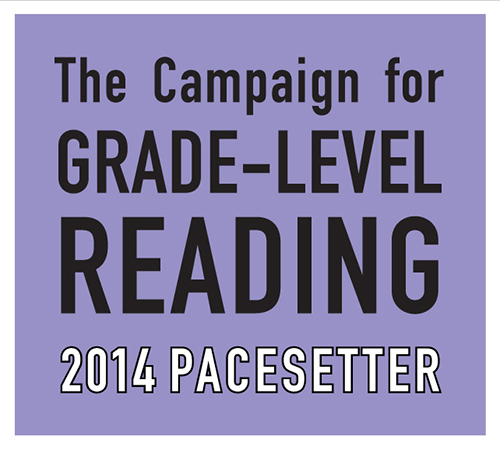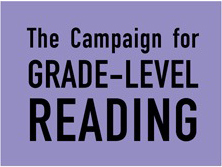Georgia Honored as “Pacesetter” in Early Reading Work
Print This Post
Georgia is one of eight states named 2014 Pacesetters by the Campaign for Grade-Level Reading (GLR), cited for efforts to begin to turn around a crisis in early reading achievement among low-income children and in so doing, to put those children on a path to school success. Reading at grade level by the end of third grade is a key predictor of high-school graduation. More than 80 percent of low-income children miss that critical milestone.
The 2014 Pacesetters were selected after a review determined that each had taken effective action—in its own way—to push the Campaign toward its 2020 goal of increasing by at least 100 percent the number of low-income third graders reading at grade level in 12 states or more.
“Right now in Georgia, only 34 percent of third graders are reading proficiently by the end of the school year,” said Get Georgia Reading: The Campaign for Grade-Level Reading Director Arianne Weldon. “The good news is we have the ability to alter these outcomes by working together. The Get Georgia Reading Campaign connects people, agencies, organizations, sectors, disciplines, communities, and regions across Georgia around a common agenda supporting a shared expectation that all children in Georgia will be on a path to 3rd grade reading proficiency by 2020.”
All eight honorees—Arizona, Arkansas, California, Colorado, Florida, Georgia, Iowa, and Ohio—are addressing one or more of three key challenges to early reading success:
- too many children starting kindergarten not ready for school;
- too many children missing too many days of school and too much instructional time; and
- too many children losing ground over the summer and returning to school in the fall further behind than when they left.
All are engaging a wide range of people and organizations, including policymakers, public and nonprofit agencies, state and local philanthropies, business and civic leaders, and parent groups. But each also has a unique story.
“These states all have put a stake in the ground around third-grade reading,” said Ralph Smith, the managing director of the GLR Campaign. “As a group, they show that seeking to ensure more hopeful futures for vulnerable children is a bipartisan priority. And they are proving that there is no single pathway or approach and no substitute for hard work, collective action, and a shared sense of urgency.”
The Get Georgia Reading Campaign is a coalition of nearly 100 public, nonprofit and philanthropic partners addressing four pillars that create the conditions necessary for children to achieve reading success:
- Language nutrition: All children receive language-rich, adult-child interactions that are as critical for brain development as healthy food is for physical growth. Talk With Me Baby is an innovative initiative that coaches parents to be conversational partners with their babies.
- Access: All children have year-round access to learning opportunities and nutritious meals, along with supportive services for healthy development, and quality early childhood and elementary education. To increase access to healthy meals and learning in the summer, Georgia is replicating California’s Lunch at the Library program.
- Productive learning climate: All educators, families, and policymakers understand and address the impact of learning climate on social-emotional development, school attendance, engagement, and ultimately student success.
- Teacher preparation and effectiveness: All educators provide high-quality, evidence-based instruction and effective learning experiences tailored to the needs of each child, regardless of the child’s background.
“The common agenda, comprised of these four strategic pillars, is Georgia’s platform for action,” said Weldon. “Get Georgia Reading is unique in its focus on all aspects of language, literacy, development, and sustainability, and the deep commitment of public and private partners. The Campaign’s common agenda unites stakeholders focused on children and families—and aligns their efforts around a population-focused approach—to ensure that all children stay on track to achieve reading proficiency by the end of third grade.”
Reading proficiency by the end of third grade is a critical milestone on a child’s path to high-school graduation and later success because it marks the transition from learning to read to reading to learn. Students who have not mastered reading by that time are more likely to drop out of high school and struggle throughout their lives. National tests show that two-thirds of U.S. fourth graders, and four-fifths of those from low-income families, are not reading proficiently.
|
How Pacesetters across the country are addressing challenges to reading success |
| Facing measures that require keeping students in third grade if they are not reading at grade level, Arizona, Colorado, Iowa and Ohio seized the opportunity to ramp up efforts at early identification and intervention for struggling readers. These states recognized that many children — particularly those from low-income families — need help long before reaching third grade. |
| In Arizona, three foundations and three state agencies developed a 10-year Strategic Literacy Action Plan and launched “Read On Arizona,” which has more than 470 partners and reaches more than 250,000 low-income children in 20 communities. The state also developed powerful early literacy tools to help parents and educators understand and support achievement of key milestones for kids from birth to age 8. Arizona mounted a major push toward summer learning in 2014 by encouraging families to read with their children, attracting nearly 120,000 participants, and every child in the state was offered free access to a digital library through much of the year. |
| In Colorado, the organization leading the grade-level reading effort—Executives Partnering to Invest in Children (EPIC)—includes more than 65 business executives. Mile High United Way, a strong partner, won a federal Social Innovation Fund grant that is being used to provide home visitation and early literacy training for parents, plus tutoring and summer programming. And the David and Laura Merage Foundation founded Early Learning Ventures, a service that streamlines accounting and administrative operations for home- and center-based child care, generating cost savings that are reinvested to improve the quality of care and education. Denver has launched a “Countdown to Kindergarten” program to provide children with a seamless transition from preschool to kindergarten. |
| In Iowa, in 2012, six communities formed stakeholder coalitions and developed plans to tackle challenges to grade-level reading. Ames, Council Bluffs and Dubuque are improving school attendance, while Des Moines is piloting a universal developmental screening program to ensure school readiness. Marshalltown increased reading proficiency rates by 6 percent from 2011-12 to 2013-14, and Quad Cities offered summer camps that saw a 9.3 percent increase in students’ reading levels. A seventh community, Cedar Valley, is joining the original six, bringing the number of low-income children reached by the communities to almost 47,000, or 38 percent of the state’s total. There are more than 30 state and local funders involved in Iowa’s campaign and philanthropic participation is growing, in part due to the efforts of the Iowa Council of Foundations. Starting in 2017, Iowa students who continue to struggle at the end of third grade will be required to participate in a summer reading program. |
| In Ohio, the state enacted legislation called the Third Grade Reading Guarantee, specifying that students who did not meet a minimum reading standard would be retained in third grade starting with the 2013-14 school year. The state then pressed schools and school districts to take the actions necessary to fulfill a “guarantee” to their students. Every year now, from kindergarten through third grade, a student’s reading skills are assessed and if the student is reading below grade level, the school creates an individualized improvement plan and provides extra help as needed. The heightened emphasis on reading proficiency has spawned local initiatives around the state. Parents of struggling readers in Columbus were invited to Saturday “Family Literacy Academies” and the city’s “Reading Buddies” program recruited 800 volunteers to work as tutors. Dayton expanded its summer learning program, partnering with nonprofit groups like BELL (Building Educated Leaders for Life), and the Dayton public library launched a Summer Reading Club. Dayton also began making home visits to families with children entering kindergarten. |
| In Arkansas, the focus on statewide work came from the Winthrop Rockefeller Foundation, which took the lead in establishing the Arkansas Campaign for Grade-Level Reading and has enlisted the support of state agencies, education associations and early care groups. The Arkansas Campaign now is focused on three areas: state policy, including more funding for pre-kindergarten, after-school and summer programs; strategic communications, working with broadcast outlets to raise awareness of the importance of reading proficiency; and direct funding for local programs such as “parent universities,” tutoring and full-day summer camps that include literacy activities. The Reach Out and Read program, in which pediatricians encourage parents to read to their children, is serving 41,000 Arkansas children and Imagination Library is providing 10,000 children up to age 5 with a free book every month. |
| In California, top state officials have made improving school attendance a high priority. A new state funding formula enacted in 2013 requires school districts to monitor and address chronic absenteeism. Meantime, a diverse statewide coalition of policymakers, educators, local leaders and parents have launched “Summer Matters” to expand the number of students served by high-quality summer learning programs. California’s work also has attracted other allies, including the California Library Association, Pacific Library Partnership, California Association of Housing Authorities and National Association of Housing and Redevelopment Officials. The library groups and the California Summer Meal Coalition developed Lunch at the Library, a summer program to encourage early literacy while ensuring kids get nutritious meals. And public housing authorities around the state now are hosting on-site satellite libraries and organizing after-school tutoring. |
| In Florida, the state and many of its communities have emphasized the need to help struggling students long before third grade. Florida already has 10 communities in the Grade-Level Reading Communities Network and four more are preparing to join. Now, the state is launching the Florida Grade-Level Reading Campaign to create a statewide movement to promote school readiness and quality instruction, tackle chronic absence, improve summer learning and engage parents as their children’s first teacher. With support from the Helios Foundation, the Florida GLR Campaign will provide technical assistance to the 14 existing Network communities, encourage other communities to start addressing grade-level reading and mobilize and align complementary efforts targeting children in the early grades. The Florida GLR Campaign is housed at the Florida Children’s Council. |
Check out detailed profiles describing each state’s approach.
Learn more about the Get Georgia Reading Campaign, and about Georgia Family Connection Partnership’s role as Campaign host.
Contact:
Lynn Peisner
Communications Associate—Get Georgia Reading
404-527-0489
lynn@gafcp.org
Bill Valladares
GaFCP Communications Director
404-527-0043
william@gafcp.org
 |
|
